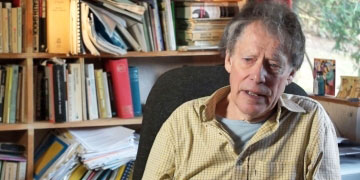Tim Black, reproductive rights activist, dead at 77
May 14, 2015
Timothy Reuben Ladbroke Black, MD, MPH, CBE, an alumnus of the Gillings School of Global Public Health and visionary international advocate for women’s reproductive rights and family planning services, died Dec. 11, 2014, in Sussex, England, School leaders have learned.
Born Jan. 7, 1937, in Sussex, Black received a medical degree from St. George’s Hospital and medical school in London in 1962, and later, a diploma in tropical medicine and hygiene at the Liverpool School of Tropical Medicine. He traveled to The University of North Carolina at Chapel Hill on a Ford Foundation fellowship, and there earned a Master of Public Health in population dynamics in 1970.
Before attention to global health was commonplace for public health professionals in the U.S., Black traveled all across Europe, Africa and the Middle East – from England to Zimbabwe, Malawi, Afghanistan, Pakistan and India.
It was in Papua New Guinea that Black, as reported in his obituary in The Times (London), had an epiphany:
As a young physician working in a remote jungle area in the mid-1960s, Black felt a flood of euphoria when he realised that a three-month-old baby boy that he had just operated on was going to live. His deep satisfaction turned to shock, then indignation, when he saw the despair on the face of the child’s mother as he placed the malnourished infant into her arms.
‘I suddenly realised that I had presented her not only with her baby, but with another mouth to feed – another dependent human being to whom she could offer nothing, merely the cruel ritual of her bare survival,’ he said. ‘She had wanted the baby to die, not live. It was at that moment that I began to realise that preventing a birth could be as important as saving a life.’
Despite reproductive rights being a political hot-button issue in the 1960s and 1970s, Black was at the forefront of advocating for and providing contraception, vasectomy and abortion services upon demand.
In 1975, with his wife Jean, he co-founded Marie Stopes International, now one of the world’s largest family planning groups. During Mozambique’s civil war in the 1980s, he established sexual and reproductive health services in a refugee camp across the border in Malawi, where more than 250,000 refugees were sheltered. In the 1990s, he organized counseling services for victims of rape during the Bosnian war.
In 1994, Queen Elizabeth awarded him Commander of the Most Excellent Order of the British Empire (CBE), for his service to British democracy — an honor shared by former Gillings School faculty member Dr. Dennis Gillings.
After learning details of Black’s life and work, Gillings School dean, Barbara K. Rimer, DrPH, called him “committed, inspiring, brilliant and heroic.”
“He is the type of alumnus whose life we are proud to celebrate,” she said.
Learn more about Dr. Black through obituary articles in The Guardian and The Times.

